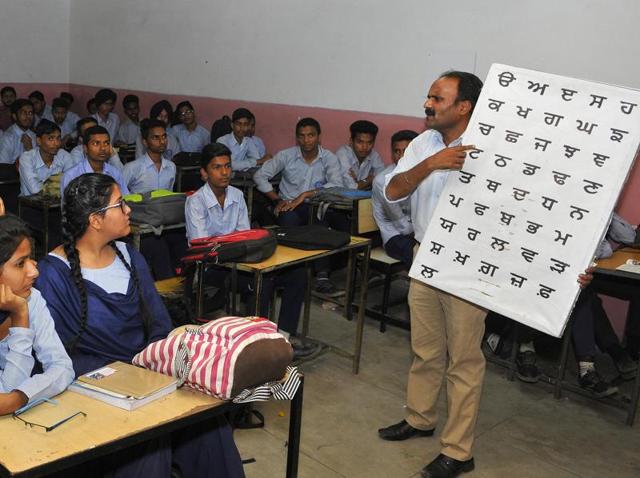The Government of Telangana’s announcement to reduce the prominence of Hindi in schools and official communications has sparked a national debate. As Telangana pushes back against the implementation and usage of Hindi, far in Punjab, a man from Karnataka is working hard to protect and promote Punjabi—a perfect blend of linguistic diversity.
Professor Pandit Rao Dharennavar, a sociology lecturer in Chandigarh and native of Bijapur district of Karnataka, promotes and defends the Punjabi language. While some states are rejecting dominant languages to maintain regional identity, Professor Rao is leading a one-man movement to encourage a language he was not born into, and he had not spoken in the first thirty years of his life. He teaches Punjabi to doctors, translates Sikh scriptures into Kannada and vice versa, knocks on the doors of the Punjab and Haryana High Court against singers using vulgarity in Punjabi songs, and advocates for Punjabi signboards across the state.
Pandit Rao Dharennavar – The Man
Currently an assistant professor at the Government College in Chandigarh, Professor Rao was appointed by the Union Public Service Commission in 2003. He began teaching sociology in English at Government College, Sector 42, but by 2005, he chose to learn Punjabi. “I realised that most of the students come from Punjab, so to give respect to the regional language, I decided to learn it and teach sociology in Punjabi only,” he shared in a conversation with The Voices.
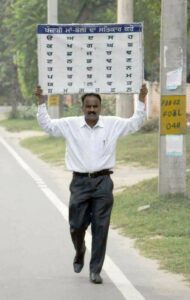
Language Awakening or Resistance
Rao sees the Telangana government’s opposition to the imposition of Hindi as a political move without any rationale. As an academic, teacher and writer, he feels that such actions must be stopped. Hindi has long been promoted, especially in South India, through the ‘Dakshina Bharat Hindi Prachar Sabha’. He added that the Hindi Prachar Sabha is still working, and if politicians are trying to banish Hindi in their state, it is nothing more than a political move.
Why Punjabi, not Kannada
Rao’s dedication to Punjabi over his mother tongue, Kannada, may puzzle many. But for him, the choice was spiritual, not political. He didn’t abandon Kannada but enriched it by translating spiritual texts. After learning Punjabi, he translated Japji Sahib, a composition by Guru Nanak Dev, into Kannada and “vachanas” from Kannada into Punjabi. He lamented that in Chandigarh, the capital of Punjab, Punjabi is still not compulsory in many schools and colleges. Even shop hoardings are mostly in English, for which he visits shops to encourage them to use Punjabi in their daily lives.
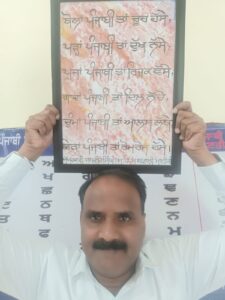
From Admiration to Legal Action
Beyond the classroom, Professor Rao filed a Public Interest Litigation (PIL) in the Punjab and Haryana High Court requesting the proper usage of Punjabi. In 2016, Rao filed a PIL against the use of vulgar language in Punjabi songs that promote drugs, alcohol and objectification of women — the violation of the cultural heritage of Punjab. In 2019, he won the case, and the court ordered such songs to be banned. He was motivated to take this step after a particular incident where a pregnant dancer was shot dead while performing on one of the songs.
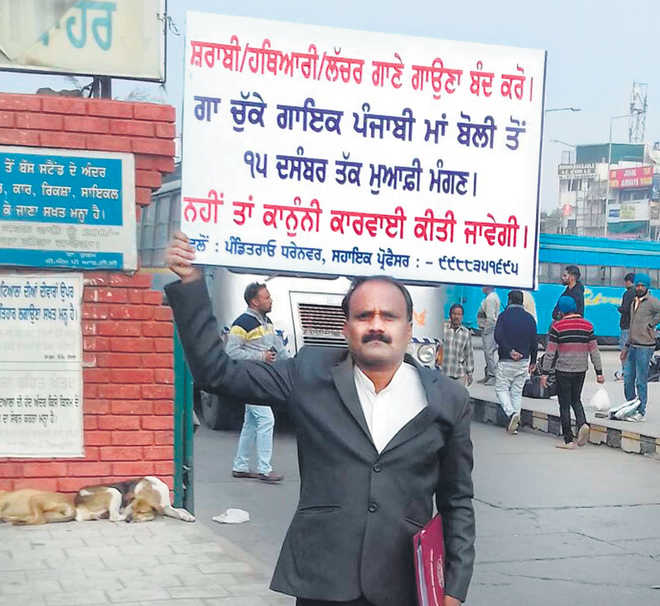
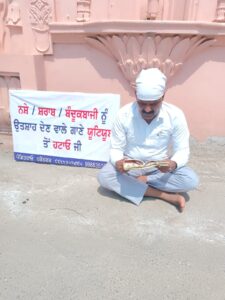
Facing Criticism or Receiving Support
Fighting a battle is tough, but Rao has only received appreciation from his students, colleagues, and even people in Karnataka. “I have been fighting this battle since 2016 and haven’t faced a single issue or an inconvenience doing so, “I feel only happiness, divinity, and peace,” shared Professor Dharennavar. People have hugged him, calling his mission god’s wish and blessing. He also mentioned that he had never received any threats from gangsters or anyone else. “Everyone knows this is a moral duty of Punjabis and a good cause,” he said. He also acknowledged his colleagues for their support by sharing his college duties, allowing him to focus on his mission. His friends in Karnataka also respect his dedication and thank him for translating the Japji Sahib, which is now used in many gurdwaras of Karnataka.
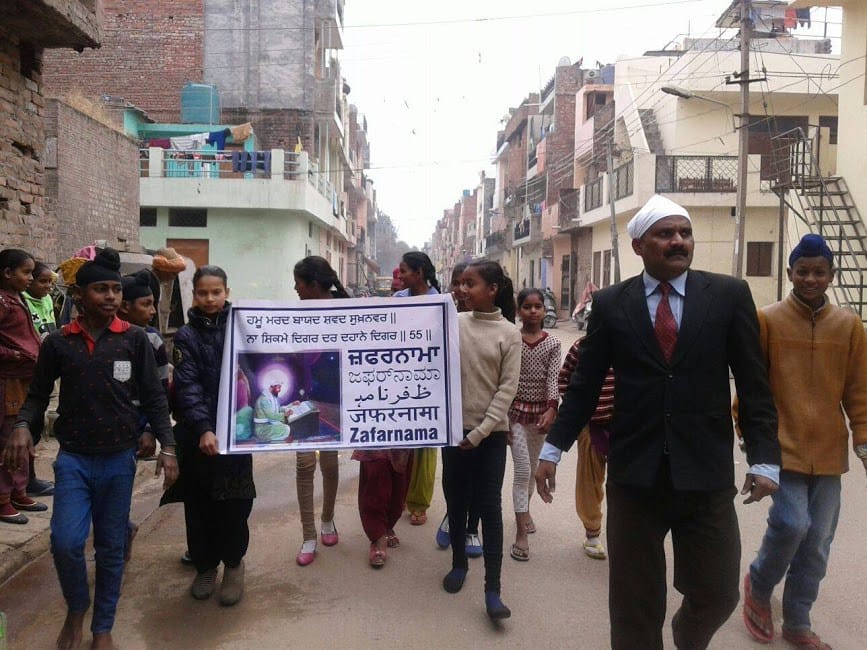
Are Institutions doing enough??
Rao feels that Indian educational institutions are not doing enough to conserve and promote regional languages and thinks that the absolute failure may lie at the policy level. He believes Punjab isn’t doing enough to save its own language. The government has implemented several policies to make Punjabi compulsory, but the people are not promoting the language among themselves or to the younger generation.
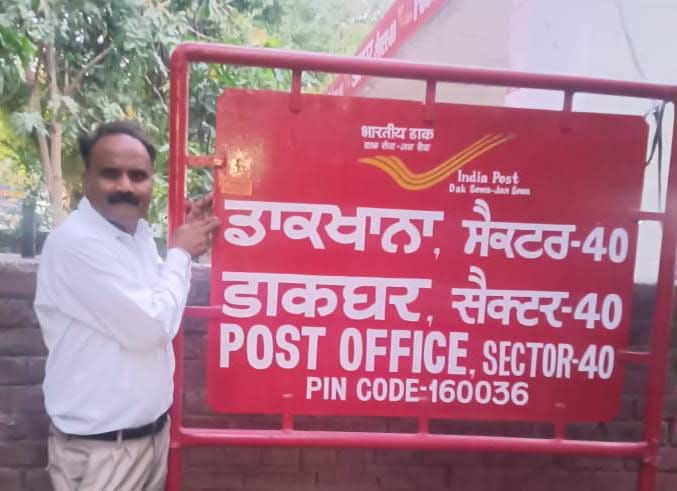
Appreciating the five-time Chief Minister of Punjab, late Prakash Singh Badal, for making Punjabi compulsory in 2008, Pro Rao feels that the present CM, Bhagwant Singh Mann, has renewed this Punjabi promotion policy and implemented its usage in major sectors like government documentation. Rao requests citizens to use Punjabi in their nameplates, signboards, and business hoardings. “I have pledged to visit every shop and house until they change their hoarding and nameplates in the Punjabi language,” he added.
Different approaches of Punjab and Karnataka
With roots in Karnataka and a professional life in Punjab, Rao witnessed two different approaches to language preservation. He praises Karnataka for its strong cultural policies, such as gifting children books in Kannada on their birthdays, celebrating regional authors and compulsory signboards in Kannada. “In Punjab, people don’t buy regional books or use Punjabi on signboards,” he said. He lays emphasis that a revolution is needed in Punjab—like the one Karnataka underwent few decades ago. Natives of Karnataka protested, wrote articles and sang songs to save their mother tongue. He added that South Indian states, such as Telangana, Tamil Nadu, Kerala, and Karnataka, are strict about their languages and do not permit or accommodate any other regional languages. In contrast, he finds Punjabis easily switching to Hindi. “If people of Tamil Nadu can’t leave Tamil, and people of Telangana can’t leave Telugu, then why do Punjabis leave Punjabi and start speaking Hindi?” he questioned.
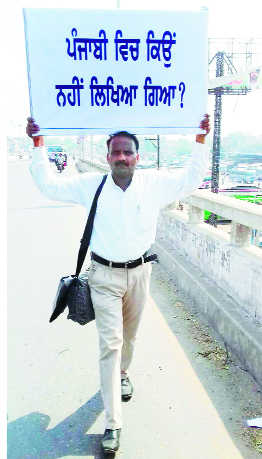
What Telangana can Learn
Based on his observations in both states, Rao believes there are important lessons for regions like Telangana. His suggestions point toward policy-level commitment and educational emphasis — essential measures to keep a language alive and relevant.
“Telangana needs to learn that it doesn’t have to be rigid about languages,” he said. Referring to the New Education Policy of 2020, which mandates the three-language rule, including Hindi. He questioned, “Till date, only two Prime Ministers have come from South India. Why? Because of their non acceptance towards Hindi. If they don’t learn or accept Hindi, how can they work for the whole country?” According to him, it is the reason behind the hesitation of Hindi-speaking states in electing leaders from the South. “If the Telangana Chief Minister wants to achieve heights in his political career, he must accept Hindi,” he asserted.
A Moment that made it Worth it
Every journey has a defining moment — when all the effort feels worth it. For Rao, it came as a blessing from a stranger, a gesture that reinforced his mission. He recalled how many Punjabis had told him that he was doing something that they should have done. One instance that has stayed with him is from 2018, when he was involved in a legal dispute. “I was walking home around 7:30 pm after attending court proceedings. A van stopped at some distance, from it a transgender woman stepped out and rushed towards me,” he reminisced. The woman said his hard work and dedication would be rewarded and that she would pray for him with her whole heart. “She placed her hand on my head, blessed me, and left,” he said. The very next year, Rao won the case. “I truly believe it was her blessing that worked like a miracle as it felt incredibly powerful,” he remarked.
Prof Rao gives his daughter a Sikh name – Khivi
Prof. Rao has named his daughter Khivi, after the great Sikh woman Mata Khivi Ji, who was the wife of the second Sikh master, Sri Guru Angad Dev Ji. Mata Khivi is known to have prepared langar (food prepared in a communal kitchen for all) and distributed it among the people in the 15th century. He also observes the birth anniversaries and martyrdom days of the Sikh Gurus and great Sikh leaders.
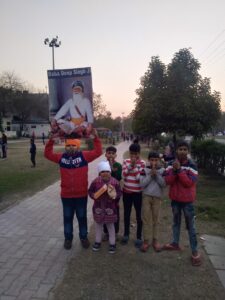
Vision for India’s Linguistic Future
Can India become a country where Punjabi, Tamil, Kannada, and Hindi, all languages, thrive, not in competition, but in harmony? Rao believes that every citizen should support the central government’s policy of Ek Bharat Shreshtha Bharat. “The vision will succeed only if people encourage and respect regional languages while also being open to learning one another’s. If a person lives in Punjab, they should learn the Punjabi language. If someone lives in Telangana, they should learn Telugu,” he said.
In an era when language has become politicised, Professor Rao’s journey remains personal, spiritual, and inclusive. He’s not asking anyone to abandon their mother tongue — only to love and respect all languages equally.
Photos in arrangement with Professor Rao
Copy Editor: Arunima Maharshi

